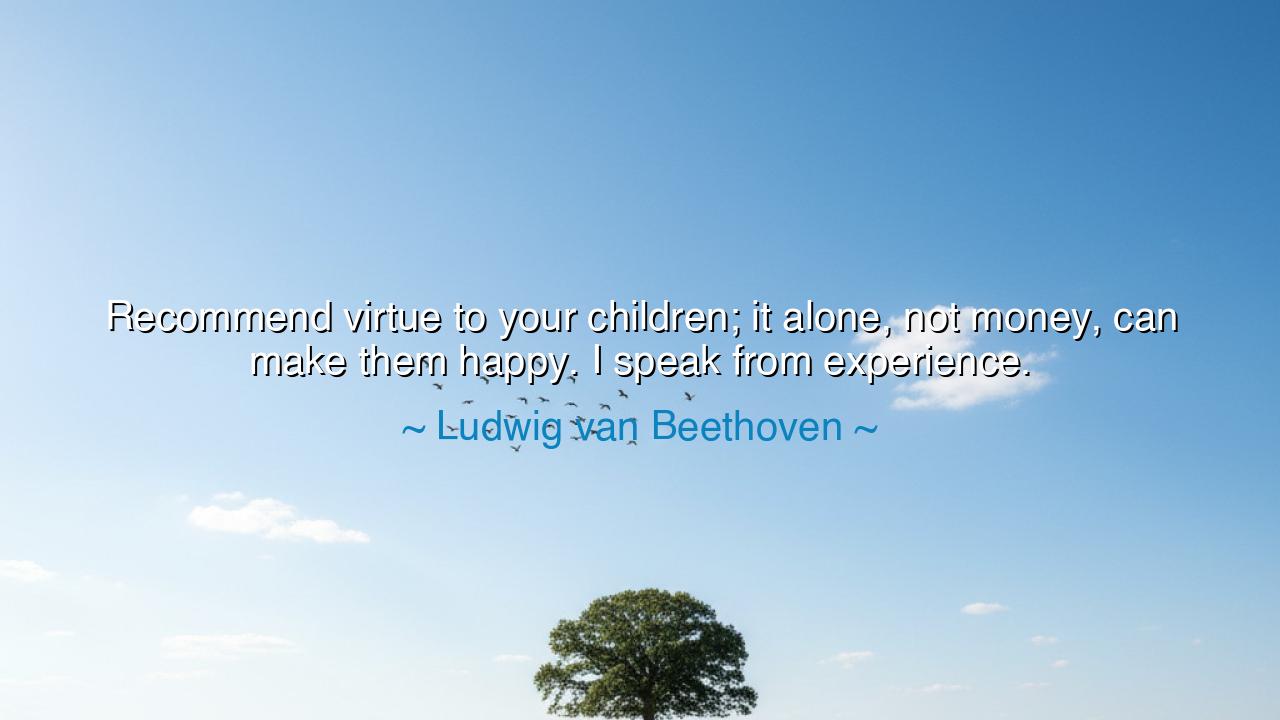
Recommend virtue to your children; it alone, not money, can make
Recommend virtue to your children; it alone, not money, can make them happy. I speak from experience.






In the twilight of his days, when the fires of youth had dimmed but the soul still blazed with music, Ludwig van Beethoven uttered words that echo through the ages: “Recommend virtue to your children; it alone, not money, can make them happy. I speak from experience.” These were not the idle musings of a man untouched by hardship, but the confession of one who had walked through storms both worldly and divine. He who had conquered silence itself — who composed symphonies while deaf to their sound — knew that true joy is not bought with gold but born of virtue, that ancient light which no darkness can extinguish.
In his youth, Beethoven knew poverty and humiliation. His father, a man broken by drink, sought to turn the boy into a prodigy for profit, beating music into him as one might forge a sword from raw iron. Yet it was not wealth that preserved Beethoven’s spirit through those trials — it was his moral courage, his unyielding belief in the dignity of art and the sanctity of the human soul. He lived in bare rooms, dressed in worn coats, and often ate little. Still, his heart thundered with the music of eternity. He could not hear applause, yet he composed for the heavens. His joy was not in possession, but in purpose.
Beethoven’s life is a testament to the ancient teaching that virtue is the highest good, the only wealth that neither thief nor time can take. Virtue, to the ancients, was not mere morality; it was the harmony of the soul — courage, wisdom, temperance, and justice, each playing its note in balance. To live virtuously was to be in tune with the divine order of the cosmos. The Stoics called it eudaimonia — the happiness of a soul in accord with nature. Beethoven, though he lived centuries later, walked that same path. When the world denied him comfort, he found solace in integrity. When others sought fame, he sought truth in sound. And so, even amidst torment, he touched transcendence.
Consider too the story of Marcus Aurelius, the philosopher-king of Rome. Surrounded by luxury, he wore the robe of discipline. Crowned with power, he bowed to duty. He knew that gold can purchase obedience but not love, comfort but not peace. In his Meditations, he wrote, “A man’s worth is measured by the worth of what he values.” Thus, when the empire trembled, Marcus stood unshaken, for his foundations were not built on fortune but on virtue. Like Beethoven, he understood that happiness springs not from what one holds, but from what one is.
Beethoven’s words, “I speak from experience,” carry the weight of a man who learned through suffering. In his deafness, he was stripped of every worldly pleasure his art could bring. Yet in that silence, he discovered a greater melody — the music of the soul, unplayed yet eternal. Virtue gave him the strength to endure, the clarity to create, the serenity to forgive. In his solitude, he was never truly poor; he was rich in character, rich in the courage to live for something beyond himself.
The lesson, then, is clear as a mountain spring: Do not teach your children to chase wealth, but to cultivate virtue. Let them learn compassion before ambition, integrity before success, gratitude before gain. For wealth without virtue is a gilded cage — it shines, but it imprisons. Teach them to labor not for luxury, but for excellence; not for applause, but for truth. A virtuous heart can sleep in peace, while the greedy soul tosses in golden beds.
And so, my friends, if you would raise generations strong and noble, sow the seeds of virtue. Speak to your children not only of what they must achieve, but of who they must become. Tell them that money may build a house, but virtue builds a home; that fame may echo for a season, but goodness resounds forever. For when the storms of life descend, when fortune turns her fickle face away, only the virtuous will stand unbroken — serene, steadfast, and free.
Thus, remember Beethoven’s counsel as sacred truth: Virtue alone brings happiness. Let your life be a symphony of courage, kindness, and truth. Let every deed be a note of harmony in the great song of existence. And when your time comes to speak to the generations after you, may your words, too, carry the quiet authority of experience — that virtue, not wealth, is the true measure of a life well lived.






AAdministratorAdministrator
Welcome, honored guests. Please leave a comment, we will respond soon